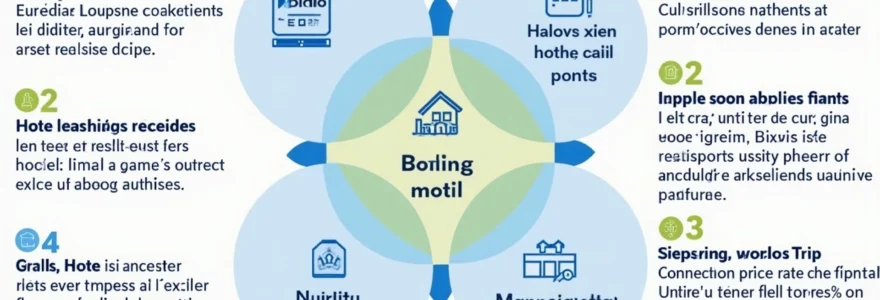In the ever-evolving landscape of travel and hospitality, savvy travellers are constantly seeking ways to maximize their budgets without compromising on quality. One strategy that’s gaining traction is booking hotel rooms directly rather than through third-party platforms. This approach can often lead to unexpected savings and added perks, but understanding the intricacies of hotel revenue management and pricing strategies is key to unlocking these benefits.
Direct booking advantages in hotel revenue management
Hotels have long been grappling with the double-edged sword of online travel agencies (OTAs). While these platforms provide extensive reach and visibility, they also come with hefty commission fees that eat into hotels’ profit margins. As a result, many hotels are now actively incentivizing direct bookings to reclaim control over their revenue streams and customer relationships.
By booking directly, guests often gain access to exclusive rates and packages that aren’t available on OTA platforms. Hotels can afford to offer these discounts because they’re not paying commission fees, which typically range from 15% to 30% of the booking value. This direct approach allows hotels to pass on some of these savings to guests while still maintaining healthier profit margins.
Moreover, direct bookings give hotels valuable first-party data about their guests, enabling them to provide more personalized services and targeted marketing in the future. This data-driven approach can lead to improved guest experiences and increased loyalty, creating a win-win situation for both hotels and travellers.
Rate parity and OTA commission structures
Understanding the concept of rate parity is crucial when comparing hotel prices across different booking channels. Rate parity agreements between hotels and OTAs often require that the same rates be offered across all distribution channels. However, these agreements have come under scrutiny in recent years, with some regions relaxing or banning such restrictions.
Expedia’s standard commission rates for hotels
Expedia, one of the largest OTAs globally, typically charges hotels a standard commission rate of 15-20% for each booking. This significant cut means that hotels often have to inflate their base rates to maintain profitability when listing on the platform. As a result, savvy travellers might find better deals by going directly to the hotel’s website or contacting them via phone.
Booking.com’s tiered commission model
Booking.com employs a tiered commission structure that can range from 10% to 25%, depending on various factors such as property location, type, and performance on the platform. This model can sometimes lead to higher prices on Booking.com compared to direct hotel bookings, especially for properties in lower commission tiers trying to maintain their profit margins.
Hotels.com’s collected payment vs. agency model
Hotels.com operates on both collected payment and agency models. In the collected payment model, Hotels.com charges a higher commission (typically around 25%) but handles the payment processing. The agency model involves lower commissions but requires hotels to manage payments themselves. This dual approach can result in varying prices across different booking channels, often making direct bookings more competitive.
Impact of merchant vs. agency models on pricing
The distinction between merchant and agency models used by OTAs can significantly impact final pricing for consumers. In the merchant model, OTAs purchase rooms in bulk at discounted rates and resell them at a markup. While this can sometimes lead to lower prices for consumers, it often results in less flexibility and stricter cancellation policies. The agency model, where OTAs act as intermediaries, typically offers more competitive rates and flexible terms, making it easier for hotels to match or beat these prices through direct bookings.
Hotel loyalty programs and direct booking incentives
Hotel chains have been doubling down on their loyalty programs to encourage direct bookings. These programs often offer exclusive rates, point accrual, and additional perks that aren’t available when booking through OTAs. Let’s explore how some major hotel chains are leveraging their loyalty programs to drive direct bookings.
Marriott bonvoy’s points accrual system
Marriott Bonvoy, one of the most comprehensive hotel loyalty programs, offers members the ability to earn points on room rates and eligible hotel purchases. When booking directly, members can earn up to 10 points per dollar spent, depending on their membership tier. These points can be redeemed for free nights, upgrades, and experiences, providing significant value that isn’t available through OTA bookings.
Hilton honors’ Member-Exclusive rates
Hilton Honors takes a direct approach to incentivizing direct bookings by offering member-exclusive rates. These rates are typically 2-3% lower than the best available rate found on OTAs. Additionally, Hilton Honors members enjoy benefits such as digital check-in, room selection, and the ability to use points to book rooms, making the direct booking experience more appealing and personalized.
IHG rewards’ price match guarantee
IHG Rewards goes a step further with its Best Price Guarantee. If a member finds a lower rate for the same stay on another booking platform, IHG not only matches that rate but also gives the member a reward of points or a discount on their stay. This aggressive price-matching strategy gives travellers confidence in booking directly, knowing they’re getting the best possible deal.
Hyatt’s world of hyatt elite status benefits
World of Hyatt emphasizes elite status benefits for direct bookers. Members who book directly can earn night credits towards elite status, enjoy room upgrades, and access exclusive experiences. These perks, which are not available through OTA bookings, can provide significant value, especially for frequent travellers who can quickly accumulate elite status benefits.
Metasearch engines and direct booking channels
Metasearch engines have become powerful tools for hotels to drive direct bookings while still maintaining visibility in the competitive online marketplace. These platforms aggregate prices from various sources, including direct hotel websites, allowing travellers to compare rates easily.
Google hotel ads’ commission vs. CPC models
Google Hotel Ads offers hotels flexibility in how they pay for visibility. The commission model allows hotels to pay a percentage of the booking value, similar to OTAs, but often at a lower rate. The cost-per-click (CPC) model, on the other hand, charges hotels only when a user clicks through to their booking page. This flexibility enables hotels to optimize their direct booking strategy based on their specific needs and market conditions.
Tripadvisor’s TripConnect instant booking platform
TripAdvisor’s TripConnect Instant Booking allows hotels to receive direct bookings through the TripAdvisor platform. While this isn’t a true direct booking in the traditional sense, it often comes with lower commission rates than OTAs and allows hotels to maintain control over the guest relationship. This hybrid approach can result in more competitive pricing for travellers while still providing hotels with valuable guest data.
Kayak’s direct booking links for hotels
Kayak, another popular metasearch engine, provides direct booking links alongside OTA options. This setup allows hotels to showcase their direct rates prominently, often highlighting any price advantages or additional perks available for direct bookers. By using these platforms strategically, hotels can increase their direct bookings while still benefiting from the wide reach of metasearch engines.
Technology and direct booking optimization
The rise of sophisticated hotel technology has played a crucial role in enabling hotels to compete more effectively for direct bookings. These tools help hotels manage their distribution channels, optimize pricing, and create personalized experiences for guests.
Siteminder’s channel manager for rate distribution
SiteMinder’s Channel Manager allows hotels to distribute their rates and availability across multiple channels simultaneously. This technology ensures rate parity across platforms while giving hotels the flexibility to offer special rates or packages on their direct booking channels. By streamlining this process, hotels can maintain competitive pricing and availability across all channels, including their own website.
Triptease’s price check widget for conversion
Triptease’s Price Check Widget is a powerful tool for increasing direct bookings. It displays real-time price comparisons directly on the hotel’s website, showing visitors how the direct booking rate compares to OTA prices. This transparency builds trust and encourages visitors to book directly, knowing they’re getting the best available rate.
Hotelchamp’s personalization tools for direct bookings
Hotelchamp offers a suite of personalization tools designed to increase direct bookings. These tools analyze visitor behavior and tailor the booking experience accordingly, offering personalized incentives, messaging, and offers. By creating a more engaging and relevant experience, hotels can significantly increase their direct booking conversion rates.
Legal and regulatory factors affecting hotel pricing
The legal and regulatory landscape surrounding hotel pricing and distribution has been evolving rapidly, with significant implications for both hotels and consumers.
Eu’s booking.com antitrust case and rate parity
The European Union’s antitrust case against Booking.com led to significant changes in rate parity agreements. Many EU countries now prohibit wide rate parity clauses, which previously required hotels to offer the same or better rates on OTAs as they did on their own websites. This change has given hotels more freedom to offer better rates through direct bookings, potentially leading to more competitive prices for consumers who book directly.
US hotel booking scam prevention act impact
In the United States, the Hotel Booking Scam Prevention Act aims to protect consumers from fraudulent booking websites. This legislation has indirectly boosted direct bookings by increasing consumer awareness about the risks of booking through unfamiliar third-party sites. Hotels have leveraged this awareness to promote the security and reliability of booking directly through their official channels.
Australia’s ACCC guidelines on pricing transparency
The Australian Competition and Consumer Commission (ACCC) has implemented guidelines to ensure greater pricing transparency in the hotel industry. These guidelines require hotels and OTAs to display all-inclusive pricing, making it easier for consumers to compare rates across different booking channels. This transparency has often highlighted the competitive advantage of direct bookings, especially when hotels offer additional perks or flexible cancellation policies.
As the hospitality industry continues to evolve, understanding these complex dynamics can help travellers make more informed decisions about their bookings. While OTAs still play a significant role in the travel ecosystem, the growing trend towards direct bookings offers savvy consumers opportunities for savings and added value. By considering factors such as loyalty programs, rate parity, and the specific offerings of each hotel, travellers can often find that booking directly with hotels can indeed save them more.


